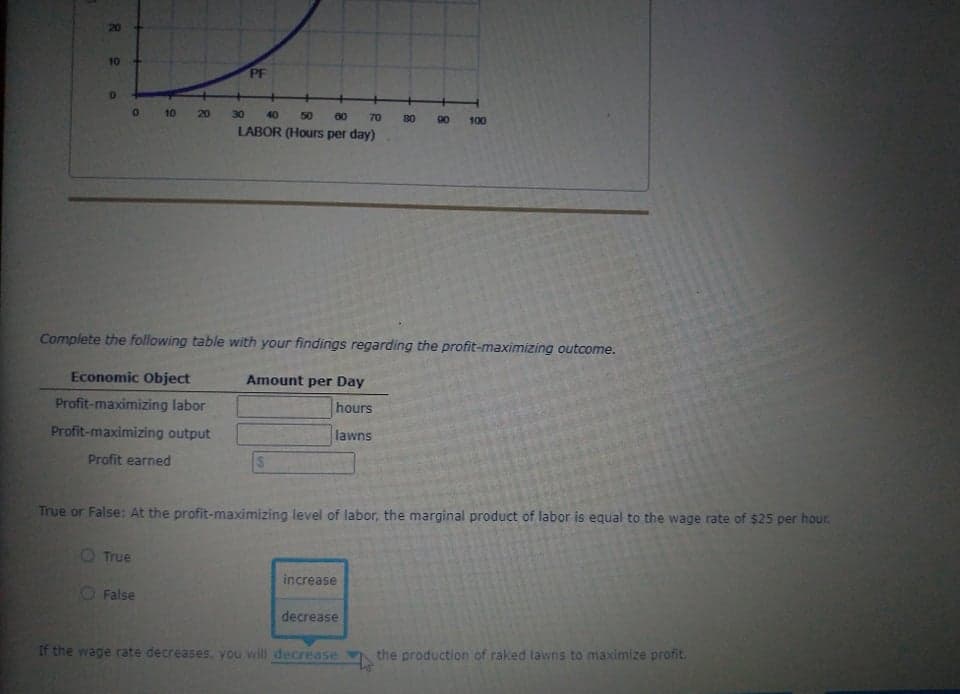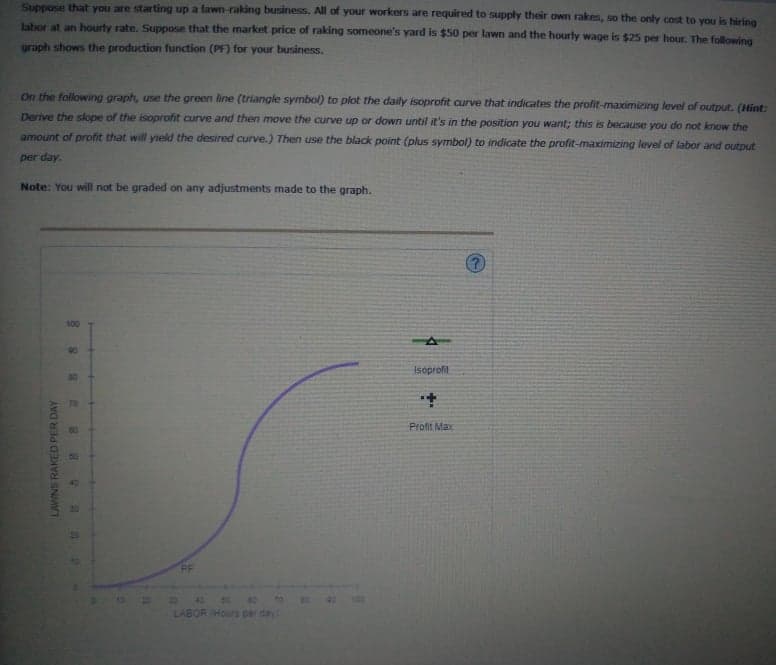Complete the following table with your findings regarding the profit-maximizing outcome. Economic Object Amount per Day Profit-maximizing labor hours Profit-maximizing output lawns Profit earned S True or False: At the profit-maximizing level of labor, the marginal product of labor is equal to the wage rate of $25 per hour. O True increase O False decrease If the wage rate decreases, you will decrease the production of raked lawns to maximize profit.
Complete the following table with your findings regarding the profit-maximizing outcome. Economic Object Amount per Day Profit-maximizing labor hours Profit-maximizing output lawns Profit earned S True or False: At the profit-maximizing level of labor, the marginal product of labor is equal to the wage rate of $25 per hour. O True increase O False decrease If the wage rate decreases, you will decrease the production of raked lawns to maximize profit.
Chapter7: Production And Cost In The Firm
Section: Chapter Questions
Problem 3.7P
Related questions
Question

Transcribed Image Text:20
10
PF
10
20
30
40
50
60
70
30
90
100
LABOR (Hours per day)
Complete the following table with your findings regarding the profit-maximizing outcome.
Economic Object
Amount per Day
Profit-maximizing labor
hours
Profit-maximizing output
lawns
Profit earned
True or False: At the profit-maximizing level of labor, the marginal product of labor is equal to the wage rate of $25 per hour.
O True
increase
O False
decrease
If the wage rate decreases, you will decrease
the production of raked lawns to maximize profit.

Transcribed Image Text:Suppose that you are starting up a lawn-raking business. All of your workers are required to supply their own rakes, so the only cost to you is hiring
labor at an hourty rate. Suppose that the market price of raking someone's yard is $50 per lawn and the hourly wage is $25 per hour. The following
graph shows the production function (PF) for your business.
On the following graph, use the green line (triangle symbol) to plot the daily isoprofit curve that indicates the profit-maximizing level of output. (Hint:
Derive the slope of the isoprofit curve and then move the curve up or down until it's in the position you warnt; this is because you do not know the
amount of profit that will yield the desired curve.) Then use the black point (plus symbol) to indicate the profit-maximizing level of labor and output
per day.
Note: You will not be graded on any adjustments made to the graph.
100
90
Isoprofit
30
Profit Max
40
FF
20
LABOR Hours per day
LAWNS RAKED PER DAY
Expert Solution
This question has been solved!
Explore an expertly crafted, step-by-step solution for a thorough understanding of key concepts.
This is a popular solution!
Trending now
This is a popular solution!
Step by step
Solved in 3 steps with 2 images

Knowledge Booster
Learn more about
Need a deep-dive on the concept behind this application? Look no further. Learn more about this topic, economics and related others by exploring similar questions and additional content below.Recommended textbooks for you



Exploring Economics
Economics
ISBN:
9781544336329
Author:
Robert L. Sexton
Publisher:
SAGE Publications, Inc



Exploring Economics
Economics
ISBN:
9781544336329
Author:
Robert L. Sexton
Publisher:
SAGE Publications, Inc

Microeconomics: Principles & Policy
Economics
ISBN:
9781337794992
Author:
William J. Baumol, Alan S. Blinder, John L. Solow
Publisher:
Cengage Learning

